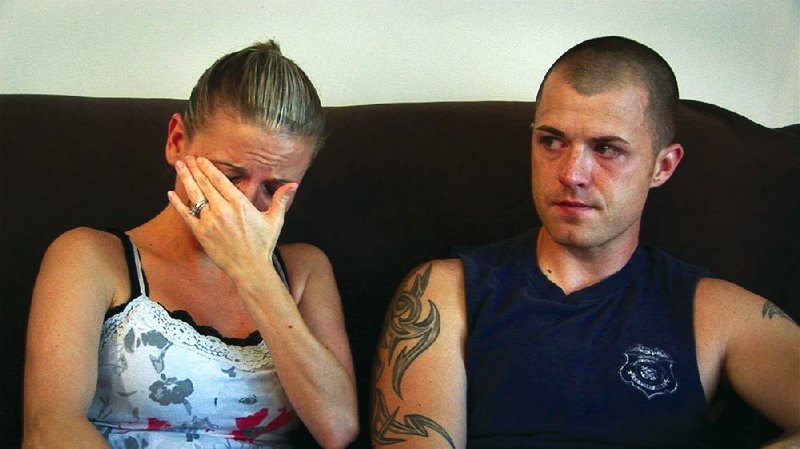LITTLE ROCK — The Invisible War
88 Cast: Documentary Director: Kirby Dick Rating: Not rated Running time: 93 minutes
About 20 years ago, I spent several months researching sexual abuse in prisons, a project that ultimately put me in touch with more than 50 men and women who’d been abused while incarcerated. All of their stories were sad, but more distressing was the realization that rape was accepted as a distasteful but inevitable part of prison: It was what happened when fresh meat was introduced into a population of predators.
I suppose one could argue that being raped was a risk assumed when one embarks on a life of crime.
But is rape really “incident to military service,” as a U.S. district judge ruled in December? The judge did so as he dismissed a class-action lawsuit filed by 28 current and former service members (including three men) for sexual assaults they allege happened while they were on active duty. (By effectively labeling sexual assault an “occupational hazard” of service, the court invoked the long-standing Feres doctrine, which prevents service members from collecting damages from the government for injuries suffered in the course of their duties.)
The Invisible War by Academy Award-nominated documentarian Kirby Dick (This Film is Not Yet Rated, Outrage) makes a compelling case that the military is, as a retired Army general says, “a target-rich environment” for sexual predators. It is a difficult film to watch, but it should be harder to ignore.
It is designed to provoke outrage at what it contends is the institutional victim-blaming and shaming directed by the military establishment at those who dare report their complaints. While 20 percent of women in the armed forces report being sexually assaulted, the Department of Defense estimates that sexual assault against women in the military is underreported by some 86 percent. (There’s reason to suspect the underreporting rate among male service members is even higher.)
That said, it ought to be pointed out that the film is more a piece of advocacy than journalism, beyond a few obligatory gestures — the former head of the military’s sexual assault prevention program, Kaye Whitley, appears on camera just long enough to confess her ignorance and provide some comic relief, in the form of an informational campaign with the tagline “Don’t risk it. Ask her when she’s sober.”
As potential entertainment, The Invisible War has limited value — it offers us a parade of disillusioned young people (mostly, but not all, women) who joined the military for a variety of what most would consider the right reasons, only to be doubly and trebly abused, first by a brother-inarms, and then by a system more invested in appearing honorable than acting honorably. (The sad recent history of sexual misconduct from the Tailhook incident in 1991 to the 2003 Air Force Academy scandal is revisited, limning a frat boy culture where sexual innuendo and horseplay is taken for granted.)
Kori Cioca, who left the Coast Guard after she said she was raped and beaten by her commanding officer, is the case study Dick spends the most time with, and it’s easy to see why. She’s a young wife and mother, struggling with post traumatic stress disorder while trying to get help for facial injuries she says were inflicted by her rapist (who was never prosecuted and remains in the Coast Guard).
A failed suicide, she is restricted to a diet of soft food, and her jaw locks up in cold weather. Dick’s cameras are there the day she receives final word from the Department of Veterans Affairs — they won’t cover the surgery she needs to repair her jaw because she didn’t serve long enough. (She didn’t serve long enough because her jaw was broken, she says, by her attacker. John Yossarian would recognize this catch.)
There are others — probably too many, for the film is most effective when it eschews the emotionalism (there is a truly harrowing scene of the husband of one of the subjects, bawling as he describes searching his home for his wife’s suicide note) for the damning concessions of the Department of Defense. For as affecting as they are, all of the various case studies presented are one-sided — no one confronts the accused.
Yet the larger picture, one that’s supported by government statistics, is horrific and unacceptable. Fully 15 percent of (anonymous) new military recruits reported having committed or attempted a sexual assault in civilian life, according to a Naval Health Research Center report. And, as various experts testify, sexual predators are unlikely to be caught, and they tend to repeat their offenses over and over. (One talking head tells us the average sexual offender has 300 victims during his lifetime.)
And if you’re raped while on duty, the only proper way to voice your complaint has traditionally been through your commanding officer. And, according to DOD figures, there’s a 1-in-3 chance your commanding officer will be friendly with the alleged perpetrator. (There’s a 15 percent chance that your commanding officer will be the alleged perpetrator.)
Secretary of Defense Leon Panetta saw this film in April, and two days later he changed that dubious reporting policy. That was an easy call. It will be much tougher to change the culture.
MovieStyle, Pages 33 on 09/28/2012
